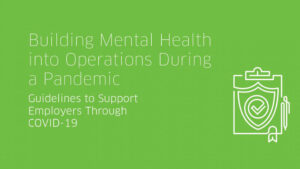Far from business as usual

Subscribe to Catalyst
Subscribe to get our magazine delivered right to your inbox
Related Articles
Subscribe to Catalyst
Subscribe to get our magazine delivered right to your inbox
Related Articles
New toolkit promotes psychologically safe workplaces during COVID-19
COVID-19 has challenged employers everywhere to rethink the way they operate. In Canada, the easing of restrictions has allowed many businesses to resume operations and welcome staff back to the workplace. But working during a pandemic is not business as usual, and the changes employers make can have a drastic impact on the mental and physical health of their staff.
“Creating a safe workplace isn’t just about protecting physical health,” said Liz Horvath, manager of Workplace Mental Health at the Mental Health Commission of Canada (MHCC), “it must also include psychological safety. The effects of the pandemic will be with us for some time, but employers can play an important role in taking proactive measures to get ahead of the anticipated mental illness curve.”
 To help them navigate this new role, the MHCC’s Opening Minds team created the Building Mental Health into Operations During COVID-19 Toolkit. The toolkit is a collection of guidelines, tip sheets, videos, conversation guides, and other resources to help employers and workers weave mental health into the fabric of their workplace.
To help them navigate this new role, the MHCC’s Opening Minds team created the Building Mental Health into Operations During COVID-19 Toolkit. The toolkit is a collection of guidelines, tip sheets, videos, conversation guides, and other resources to help employers and workers weave mental health into the fabric of their workplace.
One upcoming resource in the toolkit will be a series of guidelines to help employers address the key workplace factors that can affect staff members’ mental health during a pandemic. These factors are based on the National Standard of Canada on Psychological Health and Safety in the Workplace, a framework developed by the MHCC and CSA Group to help promote mental health and prevent psychological harm at work.
“These guidelines are about more than reacting to the pandemic in an ad-hoc way,” Horvath explained. “We want to encourage employers to build mental health into their operations proactively so they can get through the current pandemic and be better equipped for future crises. While Canada has fared relatively well during the pandemic, we have to be prepared to ride the waves that may come.”
The guidelines encourage those in leadership positions to remember that workers may be facing a range of challenges outside of work during a pandemic. “When we talk about performance, we have to talk about mental health,” said Horvath.
“Stress is cumulative, she added. “The hardships we experience away from work affect us while we’re working and vice versa. By integrating workers’ mental health into their operations, leaders can reduce their overall stress. Its about managing energy well, so people can work well and live well.”
To support workers through the pandemic, the guidelines encourage managers to
- practise empathetic listening
- understand and address the psychological impact of changes to the physical workplace
- give workers a safe space to openly share their needs and concerns
- prepare to make accommodations for workers requiring additional support.
The guide also addresses the issue of stigma, since very often, workers won’t speak up about mental health concerns, either out of a fear of being judged by peers or because of self-stigma. Workplaces that provide staff with mental health education and encourage open dialogue about mental health concerns can reduce stigma in the workplace and prompt those who need help to seek it sooner. Employers also need to manage the rise of blaming and shaming others that can occur during a pandemic by ensuring that workers receive psychological protection against the discrimination and harassment associated with social stigma and xenophobia.
The good news, according to research, is that correctly managing emergencies and disasters can have positive effects on workers’ mental health, including increased morale, resilience, and compassion.
“This pandemic has brought people together in an unprecedented way,” noted Horvath. “We can recreate that same spirit of connection and support in the workplace, as long as we’re willing to put in the work.”
Amber St. Louis




